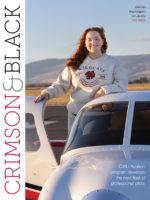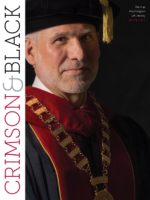
Big. Diverse. Holistic.
Adjectives used to describe CWU Law and Justice don’t fit the typical profile of university programs seeking to prepare their students for careers in the legal and criminal justice fields.
Department Chair Cody Stoddard explains that, compared to more prevalent undergraduate majors like criminal justice (response to crime) or criminology (causes of crime), the Law and Justice (L&J) program at Central is a relatively rare breed.
“We’re broader than that,” Stoddard says. “Our program focuses on our legal systems and how they interact with society and what those impacts are. Basically, we study how law interacts with social systems.”
The unique focus of the L&J program prepares students for work in a wide array of law and justice professions. Many students want to pursue traditional careers in law enforcement or law; others hope to work in corrections or pursue an advanced degree in order to become criminologists.
Due to the holistic nature of the program and the research focus of some faculty members, however, many students lean into social justice and community advocacy.
“A lot of our students have started to gain those types of skill sets and have gone on to do work in social causes,” Stoddard says. “These may not be jobs you’d typically find an ad for, but our graduates tend to discover these types of opportunities in nonprofits and other organizations.”
With 450 majors and minors, the L&J major is one of CWU’s largest. It’s also arguably one of the most diverse departments on campus.
“We have individuals from all over the world, all over the United States, from many different backgrounds,” Stoddard says. “If you’re talking about first-generation, or racial and ethnic diversity, I’d say everyone on our faculty touches one of those areas.”
The diversity within the faculty is reflected in the student body, and it has allowed CWU to train a growing number of effective, ethical law and justice professionals.
“The melding of backgrounds creates a kind of alchemy when it comes to our department. We really do have a true crossing of paths.”
—Cody Stoddard, L&J Department Chair
“The melding of backgrounds creates a kind of alchemy when it comes to our department,” Stoddard notes. “We really do have a true crossing of paths. And this gives our students better tools—when they become a law enforcement officer, for instance, and interact with people from any number of backgrounds.
“They can be purposeful about their work and much more effective when they go into their communities, run into problems, or just interact with people.”
Many students from underrepresented backgrounds initially become interested in the law and justice profession because they have identified problems in the justice system they would like to address, or they see hope in the law as a mechanism for change.
Senior Lecturer R. Shaffer Claridge, who was a practicing lawyer in Florida before coming to CWU, conveys the message that the law can serve as a social equalizer in courses such as Great American Trials.
“I think the law is a mechanism that for a long time has served to give a voice to people whose voices have been ostracized, culturally or politically,” he said. “And I think that’s something a lot of students see and respond to as an opportunity to change things for the better. Ours is one of the few professions where the potential exists to really change the status quo, and I think students see this.”
L&J offers several different high-impact practices where students can build professional experience, make connections, and put their classroom learning into practice.
The Mock Trial Team, which Claridge revived in 2017, gives students a chance to put their legal chops to the test.
“You can memorize and learn everything about the rule against hearsay and know it and understand it,” he says. “But in Mock Trial, people are competitive; they want to win. So, they don’t just want to do what they have to do to get through the assignments; they want to be a master of that rule so they can use it to potentially win in a high-stakes, competitive environment.”
As a way of helping its students prepare for their future careers, L&J also offers a number of mentorship opportunities, such as networking with alumni who are recruiting for jobs and internships, and conducting research alongside the faculty.
“We do a lot of research for agencies in our department, and faculty typically involve students in that research,” Stoddard says. “When their employers find out they can do that type of work, opportunities tend to open up for them. It’s helpful for their
careers, and it also helps them better understand the communities they’re working in.”
•••••••
L&J ALUMNI SUCCESS STORIES
Making the Law Work for Those In Search of a Better Life
For Fatimah Taha, the professors in CWU’s Law and Justice program who taught students how to communicate have made all the difference.
Taha (’23) is now a first-year law student at Seattle University, and she looks back on the mentorship she had at Central as being the catalyst for her ongoing success.

“In law school, we’re all required to do cold calls and have discussions, and having those prior experiences in undergrad helped me to be a lot more comfortable with speaking up in public,” she said.
Taha was drawn to Seattle U’s School of Law, in part, for its International Refugee Assistance Project, a legal aid and advocacy organization for refugees and displaced persons.
Her family immigrated from Palestine, and she has had friends who were refugees. She sees a legal career as a way to help make the world a better place.
“The plight of refugees has always moved me emotionally,” she said. “I think being displaced is one of the worst things that could happen.”
Taha feels fortunate to be able to use her education to help people who don’t know where to turn. In a couple more years, she’ll be making an impact as a legal professional.
“I feel like, as someone who had the opportunity to live in a first-world country where I don’t have to experience displacement, using my love of law to help people who have faced that type of suffering in their lives would be so beneficial and make an impact in those people’s lives,” she said.
•••••••
Helping Make the World a Better (and Safer) Place
Being a woman in the male-dominated field of law enforcement may have intimidated some. Not Jeanne Walford (’96).
“I went through the academy when I was 22 years old, so I was still a baby,” she said. “I’m looking around at my class, and I’m one of five women, all King County Sheriff’s Office hires. I said, ‘well, geez, look around this classroom here.’ I could tell it made people uncomfortable to point out the elephant in the room, but I was all good with it.”

Walford’s persistence paid off, as she recently celebrated her 27th year with the Sheriff’s Office. From her early days in patrol, she moved up to detective, progressively solving more difficult crimes. Her current focus is traffic-related homicide.
“We respond to serious injury crashes, fatal crashes—anything that keeps the road closed for hours,” she said.
Walford’s ace detective work has paid off for Central, too, in the form of a new scholarship fund.
In 2019, she investigated a fatal airport shuttle bus crash, caused by a “phantom vehicle” that fled the scene. The crash caused the death of Bryan Panzanaro, a husband and father of four from New Jersey.
“It was a really complex case, the kind that wasn’t really meant to be solved,” she said.
Though phantom vehicles are rarely found, Walford worked tirelessly for six months to track down the car and driver. She wrote a 16-page, highly technical affidavit that helped the team uncover the evidence they needed to solve the case.
Walford’s findings made all the difference to the criminal and civil litigation cases. In 2023, Panzanaro’s family and other survivors established an $85,000 endowment in Walford’s name, to be used for scholarships for CWU Law and Justice majors.
Walford added that she has good news for students who plan to go into law enforcement.
“I think it’s the most fun job one could ask for,” she said.
•••••••
One Class Was All It Took to Hook 2021 Graduate
Mariah Hogan (’21) didn’t want to go to college. She promised her mom she would attend one quarter and then decide whether she wanted to drop out.
As luck would have it, she happened to sign up for Law and Justice 101 with R. Shaffer Claridge. After a few weeks, she was hooked.

“It was the first time I was exposed to what it actually means to be a lawyer,” Hogan said. “And it just fascinated me, and I loved it. I remember texting my mom halfway through the quarter and saying ‘Mom, I think I’m going to finish college. And then I think I’m going to law school!’”
The L&J graduate was a two-time president of the Mock Trial Team, and, according to Claridge, one of the most decorated team members to date.
“I just remember how much I’d love when the case would drop at the beginning of the season and we’d all tear through it and try to figure out where the little holes and different arguments were,” Hogan said. “I really wouldn’t have gone to law school if it weren’t for my classes and Mock Trial.”
As a first-generation student, Hogan was surprised by how supportive the Central faculty were. She appreciated the professors who educated her about the unique challenges of being female in the legal community.
“I couldn’t have done it without all that support because I didn’t know anybody who went to law school,” she said. “It was all of them banding together to help me.”
Hogan is now a third-year law student at Lewis & Clark College in Portland, where she is focusing on child dependency cases. Though her intent entering law school was to focus on criminal defense law, Hogan kept finding herself drawn to family law.
“I love a law degree because you can change your mind,” she said. “Maybe one day I’ll finally make it to criminal defense—who knows? Right now, I’m kind of just going where it takes me.”






comments powered by Disqus